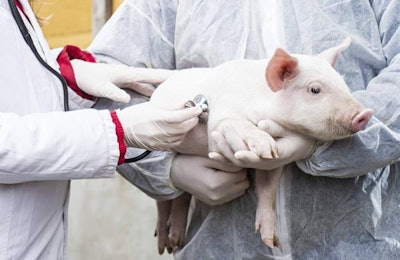
Following the detection of African swine fever (ASF) in commercial pigs in the central European state for the first time this year, the Latvian government has declared a state of emergency in three areas, aimed at preventing further spread of the virus, reported the Baltic Times. Losses for the pig producers affected are expected to run into millions.
Special measures will apply to three municipalities in the center of the country, to the east of the capital, Riga, and are expected to remain in place for at least three months.
According to Baltic Times, the areas affected are Krimulda, Adazi and Salaspils. The ASF virus was detected earlier this month at Rukas farm in Krimulda, in its pig herd of more than 5,000 animals, which will all be culled. The same company, Ancers, has facilities in the other two regions, where its animals will also be destroyed.
Raimonds Kalvans, Ancers’ CEO, said the loss of the animals will cost it millions of Euros in terms of lost animal production and company genetics as well as investments in the business. The source of infection is uncertain but the virus is known to be present in the country’s wild boar population.
Around EUR100,000 (US$107,000) from a contingency fund are to be allocated to the emergency measures.
African swine fever’s history in Latvia
Latvia reported its first ever cases of African swine fever in 2014.
According to Baltic Times, the country has since spent more than EUR13.3 million (US$14.3 million) trying to combat ASF, which is known to have infected more than 40 wild boar already this year. In 2016, the disease was found in three domestic pig herds and more than 1,100 wild boar.
ASF is a devastating infectious disease of pigs, and is usually deadly, according to the European Commission. No vaccine exists to combat this virus. It does not affect humans or species other than pigs and wild boars. It can be transmitted either via direct animal contact or via dissemination of contaminated pig meat products.
Soon after ASF was first confirmed in the European Union in early 2014, the EC deployed the Community Veterinary Emergency Team and the EU Reference Laboratory for ASF in the four countries affected – Latvia, Estonia, Lithuania and Poland - to support the national veterinary authorities to apply control measures and restrictions. Experts from the World Organisation for Animal Health (OIE), Russia and Belarus were invited to join this emergency team.

















